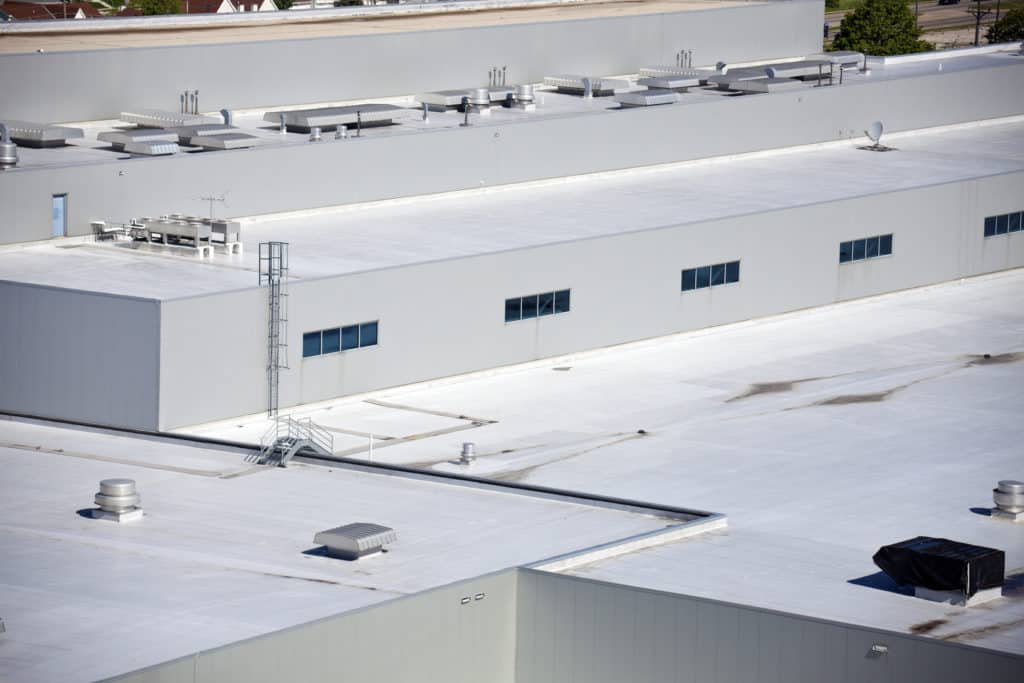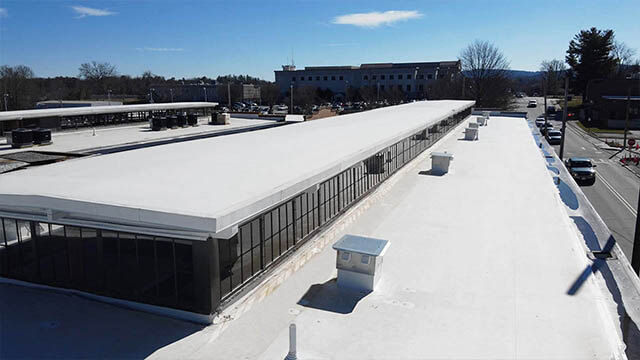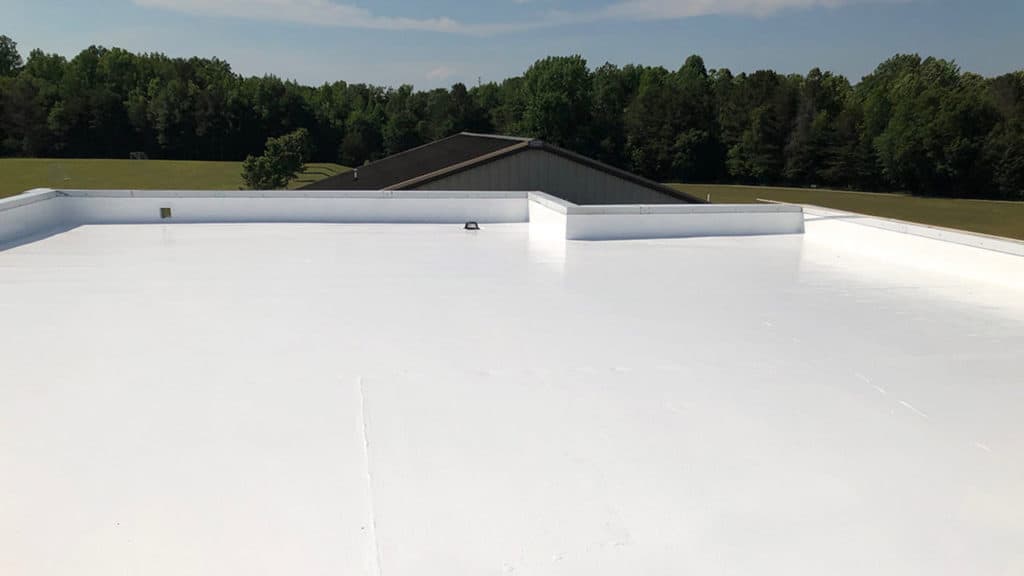Choosing the right commercial roofing materials can save you a lot of trouble. As you already know, the roof is one of the most important parts of your commercial property, although many people often ignore it.
There are several commercial roofing systems. A professional roofing company will advise on which option is the best for your region. For instance, the best roofs for San Antonio properties might not be the best for other places.
In this guide, we will be introducing different options. This should help you choose a commercial roofing system that meets your needs.
Keep reading.

How To Choose The Best Commercial Roofing Material
The various types of commercial roofing materials are designed to offer multiple performance levels. If you are not sure which one to choose, call professionals like Bison Roofing, and they will be more than happy to help. Commercial roofing is more complex and perhaps more expensive than residential roofing, which is where it requires a highly experienced and professional service provider.
Here are a few tips to kickstart your choice of roofing materials.

Understand the different materials
So, which material would be perfect for your commercial roof? The first step is to understand the different roofing materials available today. Here are the most common ones found on commercial properties:
Metal Retrofit
Metal is a highly durable material that is found on many roofs. It’s strong and can withstand different weather conditions if installed correctly.
Also, installing roofing systems does not cost as much as you have thought. Although, it still requires high experience.
PVC
Will your commercial roofing system be taking a lot of foot traffic? If yes, then PVC is a perfect option. This material is strong and exceptionally durable, perfect for the busiest commercial buildings.
TPO
TPO roofs are becoming more and more common in the modern roofing world. The material is durable, affordable, and can withstand various weather conditions better than other roofing materials.
EPDM
EPDM is a form of membrane that is used in roofing. It offers strength, durability, and affordability. You can also choose EPDM if you need a faster solution to your roofing needs.
Know your roofing needs
Different commercial roofing types are designed to meet specific goals. For instance, metal roofing systems are great for those who want sloping and extended roofs on their buildings. Also, they seem a cheaper option for most property owners.
The weather
Another factor you need to consider when choosing materials for commercial roofs is your region. The climatic conditions of your area will affect the durability and performance of your roofing system. Luckily, you have professional roofers here to take you through the advantages of each system and help you choose one that will hold in any weather.
Your budget
Just like in residential roofing, the cost of the materials is among the most important factors to keep in mind. Different materials come at different costs, depending on their quality and application. Most metal roofs, for instance, cost a bit higher than rubber roofs. However, don’t focus so much on the cost but on the quality of the materials.
Now that you understand the materials you can use on your commercial building and how to choose, let us dive into the types. We will be discussing several commercial roof types with their pros and cons.
Built up roofing
When the standard tar-and-gravel commercial roofing material is used, it forms built-up roofing or simply BUR. The roof is contracted with multiple layers to make a stronger foundation for your roofing system.
BUR is a flexible roofing system because different layers can control costs or meet specific durability. You can even add more layers to your existing roof to make it last much longer.
Advantages
BUR is one of the most common and reliable commercial roofing material options. Property owners can use it mostly on flat roofs.
One of the biggest advantages of these roofs is their durability. They will give your commercial property several years of service before you can think of changing.
Disadvantages
These roofs are ancient low-slope roofing options, which is why you will not find them on very many properties. Also, it is less tough than the other options we will be mentioning below.

Flat roofs
You will find a flat roof on most commercial properties in major cities. It’s one of the most common commercial roofing options noted for its durability and endurance.
Flat roofs have been on the market since the 1990s as a commercial and industrial roofing symbol. They still hold a huge place in this market even today.
Advantages
Flat roofs are quite cost-effective compared to other commercial roofing options, especially on pitched and steep slopes. This is because they require less material per square foot.
Also, the roofs are easier to install. That means you can save a lot if you choose flat roofs.
Our owners have many options for roofing materials and color choices. You can go for EPDM, PVC, TPO, modified bitumen, and other built-upbuilt-up roofing membrane materials.
You can move air conditioners, build solar panels, and do other things that improve the performance of your building. All these come with easy maintenance and drain cleaning.
Disadvantages
Even though flat roofs are great, they don’t lack disadvantages. These include:
- Poor drainage can cause the material to degrade much faster.
- Possible material breakdown.
- Requires highly experienced and skilled roofing professionals. Luckily, you have the team of experts at Bison Roofing to handle it all for you.
Low-slopped roofs
You will find low slope roofs in factories, warehouses, and some residential buildings. These low-sloped roofs may first appear like flat roofs, but they are slightly pitched.
Advantages
A low-sloped roof is quite efficient in drainage. It allows water to flow easily since the design directs water effectively to where it should go. You can even have gutters along them to collect water when it rains.
Also, the roof area is much less than high-pitched roofs. This makes slightly sloped roofs less expensive are they require fewer square footage of the roofing materials.
Every business owner needs a roof system that is easy to maintain and repair. You can do simple repairs to sloped roofs yourself.
You can also cut energy costs by installing solar panels or improving air circulation with roof-mounted air conditioners. These items will hold better on these roofs than on high-pitched ones.
Cons
One of the biggest downsides of these roofs is that they don’t handle heavy snow quite effectively. The snow may not melt down quickly, which adds weight to the roof.
Pitched roofing systems
A pitched roof is considered more appropriate for residential homes. However, we have seen more and more of them on commercial properties. They use materials like corrugated galvanized steel to add more strength and make them last longer.
Advantages
Pitched roofs have an increased slope, which promises an excellent runoff for snow and water. Liquid and debris roll off much faster, reducing the risk of water buildup.
Also, these roofs could significantly reduce the need for constant repairs compared to flat roofs. Its design allows the roof to last much longer.
Cons
- Hard to perform maintenance and repairs due to their position.
- Installing them is more challenging as they require increased safety procedures to transfer materials. Maneuvering around the roof increases the cost of installation.
Metal roofing
You can install metal materials on your new commercial roof, and it will look great. This is one of the most popular roofing options in the commercial real estate world.
As recommended by roofing professionals, there are different types of metal roofing systems on the market. These include corrugated galvanized steel, metal tile sheets, tin, lead, stainless steel, copper, and much more.
Advantages
Metal roofs have a protective layer surface added to manage prolonged exposure to extreme weather conditions. Also, the roofs have an attractive finish that is hard to resist.
The roofs have strong fire resistance ratings. This makes them very effective in areas vulnerable to fires. They are connected with strong air-welded seams that will remain intact even after a strong fire.
Cons
- Metal roofs are not very reliable in certain conditions. If you want energy-efficient roofs, they are not the best.
- Installing metal roofs could be more expensive than other roofing options.
PVC membrane roofing
Polyvinyl chloride (PVC) is among the most common material for commercial roofs. They can use polyurethane foam for strength and durability.
This single-ply membrane is quite effective in commercial roofing. And that is why you will find it in many roof systems in the USA.
Advantages
Durability, longevity, and fire resistance are among the main advantages of PVC membranes. The material has been flame tested along with other materials and found to perform better.
Also, PVC is resistant to moisture, wind, and chemicals. And since it has light-colored membrane sheets and thick insulation, the material is more energy efficient than others.
Cons
- It’s slightly higher in cost than other materials.
TPO Membrane roofs
Thermoplastic polyolefin (TPO) is a single-ply membrane roofing material that adds style to durability. The thermoplastic roof membrane was first used in 1986 and has since become one of the most common commercial roof types.
Advantages
Many roofing contractors choose this single-ply membrane roofing material because it’s cheaper, easier to install, and more durable compared to other options. It has similar properties as PVC and EPDM.
Apart from being durable and flexible, the material is 100% recyclable and eco-friendly. It’s also energy efficient.
Cons
- It has not been on the market for a long time.
EPDM Roofing
EPDM roofing membrane comes in black. It can also come in a white coating that reflects sunlight to increase energy efficiency.
Also known as thermoset roof membrane material, EPDM is very strong roofing material. It’s incredible where you expect a lot of foot traffic.
The rubber properties make it easily stretch and form-fit into any building. No wonder it has become a popular commercial roof type in many cities.
Advantages
EPDM roofing has been used in many flat roof industrial buildings since the 60s. Its dark color makes it perfect for cooler regions.
Cons
EPDM does not perform well in hot weather compared to other commercial roofing options. It cans shrink, tear or weaken the membrane.
Modified bitumen roofing
Modified bitumen is a common material on modern metal roofs. They are durable materials that perform exceptionally in all weather conditions.
Advantages
A modified bitumen roof is fastened to a commercial rooftop as a two-ply system. This ensures maximum stability and protection of the building structure. A solid layer on these roofs gives them strength to handle high winds and other weather conditions.
Cons
A modified bitumen roof can be quite challenging to deal with without proper installation. Also, the material is a bit more experience than other options here.
Green roofing
Green roofs are the most versatile commercial roofing options today. These energy-efficient roofs have become very popular in recent years for their sustainability.
Advantages
- Green roofs protect the entire building from the elements.
- A green roof performs greatly in managing water.
- They are very attractive.
Cons
- Installing a green roof is quite expensive. But this should not be a problem considering what you get from them.
Shingle roofing
Asphalt shingles have been used for many years as a popular roofing option for commercial roofs. There are many other shingles types, making shingle roofing a good choice.
Advantages
- Shingles are very affordable, versatile, and easy to install.
- They come with strong fire resistance ratings.
Cons
- They are not as durable as the other options discussed above. They are also vulnerable to moss and mildew.
Photovoltaic (PV) solar panels
Solar panels are another excellent option for commercial roofing. The panels absorb sunlight and turn it into usable energy. This generates long-term energy savings for the users.
Advantages
- The most energy-efficient roofing material.
- The best option for property insulation.
Cons
- Only works best in high-sun areas.
- They are quite challenging to install and expensive.
SPF Roofing
SPF uses spray polyurethane foam that starts are a liquid. It hardens to form a strong roof coating.
Advantages
- Spray-on roofing is a great option for eco-friendly commercial roofing.
- It can be applied to an existing roof for insulation and to make it more waterproof.
Cons
- It needs an experienced roofing company to install it. A wrong installation can cause serious issues within a short time.
These are the most popular commercial roofing options on the market today. If you have any
questions, contact your local roofing pros, like Bison Roofing, and you will get all the help you need.

